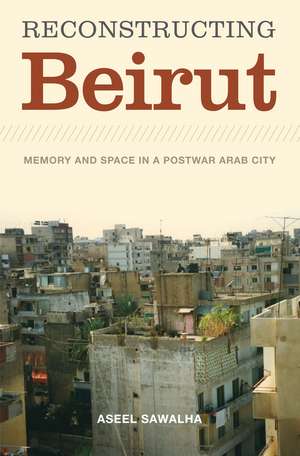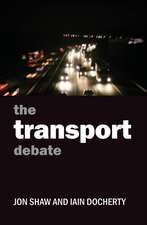Reconstructing Beirut: Memory and Space in a Postwar Arab City
Autor Aseel Sawalhaen Limba Engleză Paperback – mai 2010
At the core of the study is the theme of remembering space. The official process of rebuilding the city as a node in the global economy collided with local day-to-day concerns, and all arguments invariably inspired narratives of what happened before and during the war. Sawalha explains how Beirutis invoked their past experiences of specific sites to vie for the power to shape those sites in the future. Rather than focus on a single site, the ethnography crosses multiple urban sites and social groups, to survey varied groups with interests in particular spaces. The book contextualizes these spatial conflicts within the discourses of the city's historical accounts and the much-debated concept of heritage, voiced in academic writing, politics, and journalism. In the afterword, Sawalha links these conflicts to the social and political crises of early twenty-first-century Beirut.
Preț: 159.34 lei
Nou
Puncte Express: 239
Preț estimativ în valută:
30.50€ • 31.75$ • 25.77£
30.50€ • 31.75$ • 25.77£
Carte tipărită la comandă
Livrare economică 10-24 martie
Preluare comenzi: 021 569.72.76
Specificații
ISBN-13: 9780292728813
ISBN-10: 0292728816
Pagini: 190
Ilustrații: black & white illustrations
Dimensiuni: 140 x 216 x 13 mm
Greutate: 0.29 kg
Editura: University of Texas Press
Colecția University of Texas Press
ISBN-10: 0292728816
Pagini: 190
Ilustrații: black & white illustrations
Dimensiuni: 140 x 216 x 13 mm
Greutate: 0.29 kg
Editura: University of Texas Press
Colecția University of Texas Press
Notă biografică
Aseel Sawalha is Associate Professor in the Departments of Sociology and Anthropology and Women’s and Gender Studies at Pace University in New York City.
Cuprins
- A Note on Language
- Acknowledgments
- Introduction
- Chapter One. Beirut: A City in Transition
- Chapter Two. Downtown in "the Ancient City of the Future"
- Chapter Three. `Ayn el-Mreisse: The Global Market and the Apartment Unit
- Chapter Four. "Beirut Is Ours, Not Theirs": Neighborhood Sites and Struggles in `Ayn el-Mreisse
- Chapter Five. Cafés, Funerals, and the Future of Coffee Spaces
- Chapter Six. Placing the War-Displaced
- Afterword: Reclaiming Downtown Again
- Notes
- Bibliography
- Index
Descriere
Reconstructing Beirut contributes to a new approach to Middle East studies that applies recent theories of memory and space/place, bringing a fresh framework for analyzing contemporary Arab cultures and post-conflict cities.











